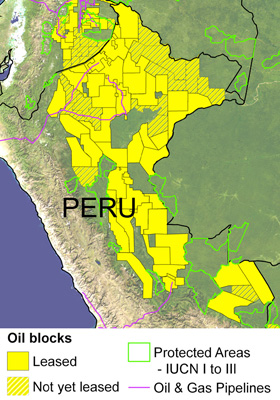Peru to proceed with oil and gas auctions in the Amazon despite indigenous protests
Despite violent protests by indigenous groups over plans to expand oil and gas exploration in the Peru’s Amazon rainforest, energy investments in the South American country are expected to increase to $1.5 billion in both 2009 and 2010, reports Reuters. Daniel Saba, president of Perupetro, Peru’s energy agency, told Reuters that the government will auction more than a dozen lots in October of November. Most of the 17 blocks are located in the country’s Amazon region, 70 percent of which has been concessioned for oil and gas exploration and development. A number of firms are already operating in the area including Repsol (Spain), Perenco (France), Pluspetrol (Argentina), Petrobras (Brazil), Maple Energy (United States), and Petroperu (Peru). South American Explorations, working on behalf of the U.S.-based Hunt Oil, launched exploration activities in a million-acre area in the Madre De Dios region late last month, according to local sources. Indigenous groups have fiercely opposed what they see as encroachment on their traditional lands. In May thousands of protesters blocked roadways and rivers in opposition to a set of presidential decrees that would have made it easier for foreign firms to develop Amazon land. President Alan Garcia responded by sending in federal police, quickly leading to a heated standoff that ended in bloodshed when 34 police and protesters were killed. The escalation was widely condemned by human rights groups and environmentalists. …
Peru to proceed with oil and gas auctions in the Amazon despite indigenous protests
